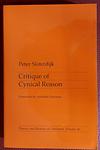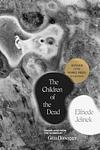The Greatest German, Austrian "Postmodern" Books Since 1980
Click to learn how this list is calculated.
This list represents a comprehensive and trusted collection of the greatest books. Developed through a specialized algorithm, it brings together 305 'best of' book lists to form a definitive guide to the world's most acclaimed books. For those interested in how these books are chosen, additional details can be found on the rankings page.
Genres
Postmodernism is a literary movement that emerged in the mid-20th century, characterized by a rejection of traditional narrative structures and a focus on self-reflexivity and intertextuality. Postmodern literature often features fragmented narratives, unreliable narrators, and a blurring of the lines between reality and fiction. It is a genre that challenges the notion of a single, objective truth and instead embraces the idea of multiple perspectives and interpretations. Postmodern literature is often seen as a response to the modernist movement that preceded it, and it continues to be a popular and influential category for contemporary writers.
Countries
Date Range
Reading Statistics
Click the button below to see how many of these books you've read!
Download
If you're interested in downloading this list as a CSV file for use in a spreadsheet application, you can easily do so by clicking the button below. Please note that to ensure a manageable file size and faster download, the CSV will include details for only the first 500 books.
Download-
1. Austerlitz by W. G. Sebald
The novel follows the story of Jacques Austerlitz, an architectural historian who was brought to England on a Kindertransport from Czechoslovakia during World War II. As an adult, Jacques embarks on a journey to uncover his past, including his original identity, his parent's fate, and his own lost history. The narrative is a haunting exploration of memory, identity, and the lasting impact of the Holocaust.
The 467th Greatest Book of All Time -
2. Concrete by Thomas Bernhard
The book is a darkly introspective narrative that delves into the mind of a reclusive, obsessive intellectual who is struggling to complete his scholarly work on the composer Mendelssohn. As he grapples with his own ailments and the perceived mediocrity of his surroundings, the protagonist's stream-of-consciousness monologue reveals his deep-seated anxieties, self-loathing, and profound isolation. The narrative is a relentless examination of the protagonist's psyche, showcasing his critical view of society and his own personal relationships, which are fraught with tension and dysfunction. Through this, the novel explores themes of artistic creation, intellectual elitism, and the suffocating nature of expectations and familial obligations.
The 1743rd Greatest Book of All Time -
3. Woodcutters by Thomas Bernhard
Woodcutters is a darkly humorous critique of Vienna's artistic elite. The story takes place over the course of a single evening, as the narrator attends a dinner party in honor of a recently successful actor. As the evening progresses, he reflects on the pretentiousness and hypocrisy of the guests, the mediocrity of their artistic achievements, and the tragic suicide of his former lover. The novel is a scathing indictment of the vanity and self-delusion of the artistic community.
The 1750th Greatest Book of All Time -
4. Wittgenstein's Nephew by Thomas Bernhard
"Wittgenstein's Nephew" is a semi-autobiographical novel that explores the friendship between the narrator and his friend Paul, who is the nephew of the famous philosopher Ludwig Wittgenstein. The story takes place in Vienna and is set against the backdrop of the Austrian mental health system. The novel delves into themes of sanity, insanity, and the fine line that separates the two, while also offering a critique of Austrian society. It is a meditation on the nature of illness, both physical and mental, and the impact it has on personal relationships and one's perception of the world.
The 3006th Greatest Book of All Time -
5. The Last World by Christoph Ransmayr
"The Last World" is a novel that reimagines the exile of the Roman poet Ovid in a remote village at the edge of the Black Sea. The story is set in a mythical time and place, where the villagers are haunted by strange transformations and echoes of Ovid's metamorphoses. The novel blurs the lines between the real and the imaginary, the past and the present, and the world of the living and the dead, creating a surreal and dreamlike atmosphere.
The 3378th Greatest Book of All Time -
6. Vertigo by W. G. Sebald
"Vertigo" is a complex narrative that combines elements of fiction, travelogue, biography, and autobiography. The novel is divided into four sections, each exploring the life and works of different historical figures such as Stendhal, Kafka, and Casanova, as well as the author's own experiences. The narrative is characterized by its exploration of themes such as memory, identity, and the past, often blurring the lines between fact and fiction. The book is also notable for its distinctive style, featuring long, meandering sentences and a lack of traditional plot structure.
The 3608th Greatest Book of All Time -
7. The Arcades Project by Walter Benjamin
"The Arcades Project" is a comprehensive and intricate examination of 19th-century Parisian life, focusing on the iron-and-glass shopping arcades that emerged as early forms of the shopping mall. Compiled from a vast array of notes and writings, the work delves into the city's architectural and urban transformations, exploring how these spaces influenced aspects of culture, politics, and everyday life. Through a montage of quotations, reflections, and critical commentary, the book presents a fragmented yet profound analysis of modernity, capturing the intersection of history, philosophy, and social theory.
The 5230th Greatest Book of All Time -
8. The Loser by Thomas Bernhard
"The Loser" is a philosophical novel that revolves around the complex relationship between three friends who are all piano virtuosos. The narrative is driven by the protagonist's obsession with his friend's suicide, which he believes was triggered by the realization that they could never surpass the genius of their third friend. The book delves into the protagonist's psyche as he grapples with themes of talent, ambition, failure, and the destructive power of comparison.
The 5733rd Greatest Book of All Time -
9. Critique Of Cynical Reason by Peter Sloterdijk
The book provides a deep exploration of cynicism as a pervasive and influential mindset in contemporary society, tracing its evolution from the classical cynicism of antiquity to its modern form, which the author describes as "enlightened false consciousness." The work delves into the philosophical, social, and psychological dimensions of cynicism, examining how it serves both as a defense mechanism and a form of social critique. Through a blend of philosophical analysis, cultural commentary, and historical insight, the book challenges readers to understand and confront the cynical attitudes that pervade modern culture and to consider the possibilities for genuine sincerity and commitment in a seemingly disenchanted world.
The 6267th Greatest Book of All Time -
10. The Children Of The Dead by Elfriede Jelinek
This novel is a unique and haunting exploration of memory, history, and the legacy of the Holocaust in Austria, presented through a complex narrative that blends elements of horror, satire, and social critique. Set in a stylized and eerie version of the Austrian countryside, the story unfolds around a protagonist who embarks on a journey that intertwines with the lives of the undead, revealing the persistent shadows of World War II and the Holocaust on contemporary society. The narrative's challenging structure, incorporating dense streams of consciousness and a shifting perspective, serves as a vehicle for the author's incisive commentary on issues of national identity, collective memory, and the dangers of forgetting the past. Through its innovative use of language and form, the book confronts readers with the unsettling realities of history's impact on the present, making it a compelling and thought-provoking read.
The 10470th Greatest Book of All Time
Reading Statistics
Click the button below to see how many of these books you've read!
Download
If you're interested in downloading this list as a CSV file for use in a spreadsheet application, you can easily do so by clicking the button below. Please note that to ensure a manageable file size and faster download, the CSV will include details for only the first 500 books.
Download








